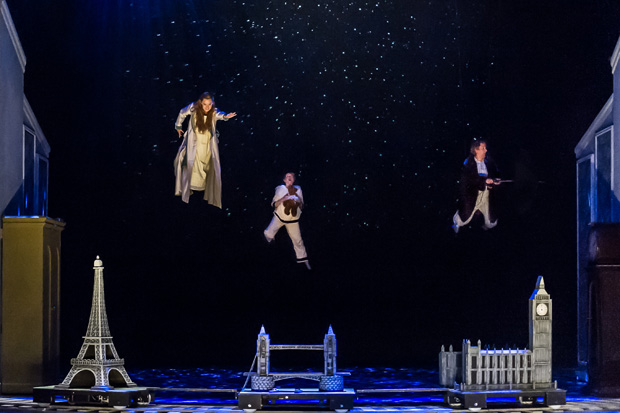In Beryl Bainbridge’s novel An Awfully Big Adventure the producer Meredith Potter issues a doughty injunction on the subject of staging Peter Pan: ‘I am not qualified to judge whether the grief his mother felt on the death of his elder brother had an adverse effect on Mr Barrie’s emotional development, nor do I care one way or the other. We all have our crosses to bear. Sufficient to say that I regard the play as pure make-believe. I don’t want any truck with symbolic interpretations.’ Symbolic interpretation hangs heavily over the rough-and-tumble jumble of Janacek, Beethoven, Stravinsky, Satie, Handel, Vivaldi, sea shanties and klezmer in Lavinia Greenlaw and Richard Ayres’s half-brilliant, half-bewildering operatic adaptation for Welsh National Opera. Alongside the raucous crowing of children liberated from adult rules (‘Kill! Kill! Kill! Kill!’) and deprived of adult protection, the creak of a saw, the wheeze of an accordion, the chime of a celesta and the ticking of the crocodile is a terrible, inconsolable grief. But whose grief is it?
Blink at the wrong time and you’ll miss the key. There amid the alphabet blocks that spell out N.E.V.E.R.L.A.N.D. at the close of Act I in Jason Southgate’s Victorian nursery design is a London underground roundel: Sloane Square. This is the station where Peter Llewellyn Davies, one of five brothers whom tiny, mother-fixated J.M. Barrie befriended, threw himself in front of a train in 1960. Sorrow and rage are present in all of Barrie’s Peter Pan stories, especially in the novel Peter and Wendy (1911), but in Keith Warner’s production the footnotes overwhelm the text. Trains are everywhere, taking Mr Darling (Ashley Holland) to work and defining him as ‘a father who leaves the house at the same time as every other father’, circling through the nursery and propelling the pirate ship commanded by Captain Hook (Holland again). His is not the only transformation. Nana (Aidan Smith) morphs from dog to maid (‘Woof! Woof! Bath! Bed!’), while tender, fragile, hysterical Mrs Darling (Hilary Summers) is reborn as the fearless warrior princess Tiger Lily. Tinker Bell is a dancing animation until she drinks the poison meant for Peter and becomes a drab little doll.
Ayres and Greenlaw have identified the predatory cruelty in the boy who can never grow up. Peter (Iestyn Morris) is a countertenor, slipping and sliding between fluting falsetto and barking chest voice, as though on the brink of puberty. His feelings towards Wendy (Marie Arnet) are ambiguous. Together they play at being parents to the Lost Boys (‘Wendy, Wendy, be our mother! Give us cake and hugs and kisses!’). But Peter is a bad parent, a bad husband, a bad child. Peter hates his mother and, by extension, all mothers, including Wendy. There are some beautiful moments, a waltzing lullaby-lament for Mrs Darling that is echoed by Wendy in Act II, delicious cameos for Tootles (Simon Crosby Buttle) and Smee (Mark Le Brocq). Erik Nielsen conducts with unflappable clarity, though Ayres’s poly-stylism feels less easy than it did in his first opera, The Cricket Recovers, an adaptation of Toon Tellegen’s children’s stories. Too little happens in Act I, too much in Act II, and the aftertaste is sour. Children will love the grandfather clock that turns into a crocodile, the familiar accessories of fur coat, top hat and teddy bear that John (Nicholas Sharratt) and Michael (Rebecca Bottone) carry from London to Neverland. Their parents will wince at the horror of missing babies, mounting bills and stifling roles as sock-darners and breadwinners that seem scarcely to have changed since Barrie met the eldest Llewellyn Davies boys in 1897. We all have our crosses to bear.
Thematic parallels between Peter Pan and Parsifal, another story of maimed monsters, treacherous kisses and motherless boys, dissolve in a concert performance as radiant and secure as that of the City of Birmingham Symphony Orchestra and Chorus under Andris Nelsons, who leaves the orchestra next month. Even the background noise emanating from Berlin, as the Berliner Philharmoniker dithers over whether it wants Nelsons to succeed Sir Simon Rattle (see p52), was hushed for six hours in which ordinary time was suspended. The pristine acoustic of Symphony Hall was intrinsic to the numinous sonority of on and off-stage voices and instruments in Acts I and III and the raw tumult and refined sensuality of Act II. From the purity of ‘Durch Mitleid wissend, der reiner Tor’ to the steady glow of redemption at the close, Nelsons and his players and singers balanced expressive urgency and expansive musical architecture. Words and music combined to extraordinary intensity, with the simplest phrases among the most powerful — Amfortas’ ‘Wehe! Wehe!’, Kundry’s ‘Dienen, dienen’. This was an outstanding cast, from Burkhard Fritz’s tireless Parsifal to Mihoko Fujimura’s tormented Kundry, James Rutherford’s gleaming Amfortas, Wolfgang Bankl’s snarling Klingsor, Paul Whelan’s sepulchral Titurel, Georg Zeppenfeld’s humane, understated Gurnemanz and the beautifully supple sextet of Flowermaidens. The silence at the end, held in the splayed fingers of Nelsons’ outstretched hand, was electric.






Comments